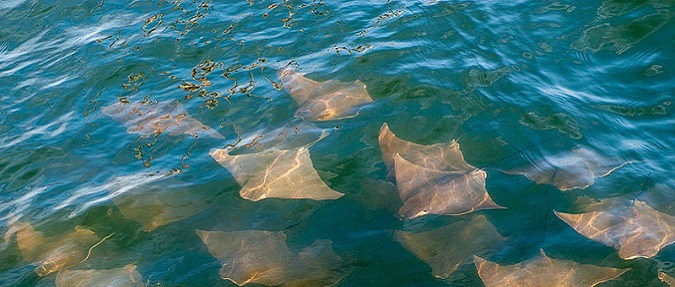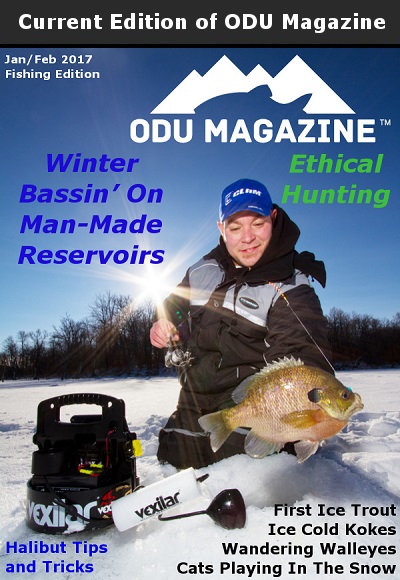The Maryland Senate unanimously approved a bill Monday night that would impose a moratorium on ray tournaments in the Chesapeake Bay while the Department of Natural Resources develops a plan for managing the species.

The vote was 46-0 on the bill, SB 268, which had been amended. The original measure, sponsored by Sen. Ronald Young, a Frederick County Democrat, would have banned bowfishing tournaments for rays permanently. But last week, Sen. Stephen Hershey, an Eastern Shore Republican, put in an amendment modifying the ban to a moratorium, and directed the department in the meantime to create a management plan for the rays.
 A bill still pending in the House calls for a permanent prohibition on ray-killing tournaments. A hearing on it is scheduled Wednesday (Feb. 15) before the House Environment and Transportation Committee. Both the House and Senate bill specify only tournaments or contests, taking no position on bowfishing parties on charter boats.
A bill still pending in the House calls for a permanent prohibition on ray-killing tournaments. A hearing on it is scheduled Wednesday (Feb. 15) before the House Environment and Transportation Committee. Both the House and Senate bill specify only tournaments or contests, taking no position on bowfishing parties on charter boats.
Young said he agreed to revising his bill because he believes that the Maryland Department of Natural Resources will address ray bowfishing tournaments by regulation after it determines how best to manage the species. The bill directs the DNR to complete its management plan by Dec. 31, with the moratorium remaining in effect until July 1, 2018.
“I think that those regulations would ban the tournaments,” Young said. “If they don’t, I’ll bring it (legislation) back for a full ban.”
Animal rights advocates called the moratorium and management plan approved by the Senate a “reasonable first step” and said they hoped it would result in permanent protections.
“Maryland still needs to fully ban these contests that are not only cruel and unnecessary, but also target a species that science shows is vulnerable to overfishing,” said Mary Finelli, Chair of the Save the Rays Coalition.
But longtime bowfisherman Kurt Wall, who organizes the major tournament in Maryland, said the legislation came down to “pure emotion” and unfairly penalized sportsmen.
“We’re not doing anything wrong, and there’s no reason for them to stop everything we’re doing,” he said.
Cownose rays enter the Chesapeake in the late spring; almost all in the Bay after July are females. They give birth there, to one pup a year. It takes a ray seven years to mature. If they are overfished, they will not bounce back quickly, researchers have said.
Cownose rays have been a contentious issue in Maryland for the last two years. Watermen have long blamed the creatures for the decline in oysters and crabs in the Chesapeake Bay and branded the rays pests. A 2007 study in the prestigious journal Science seemed to confirm that, prompting Virginia seafood officials to promote their consumption with a slogan, “Save the Bay, Eat a Ray.” A subsequent study debunked the earlier finding.
The earlier study, though, encouraged commercial bowfishing for rays as well as tournaments where bowfishermen shot the rays at close range. Robbie Bowe of Woodbridge, VA, ran the state’s main tournament for nearly 20 years before getting out of it and handing the reins to Wall. Another tournament, Battle of the Rays, has occurred on the Patuxent, and Virginia has had at least one most years. Sometimes, the bowfishermen shoved the rays’ just-born pups back inside their abdomens so the bloody catch could be logged in at a higher weight.
Despite the seafood campaign, rays are typically not eaten. They’re difficult to cook, and tend to have a bitter urine taste. Wall said his fishermen sometimes ate their catch, but the rest were legal to leave in the Bay or trash dumpsters or were carted away to become fertilizer.
None of this activity drew much attention until the summer of 2015, when animal-rights groups videotaped the contests, and TV news stations showed the gruesome footage. That sparked calls from animal-rights advocates to ban the tournaments.
At the time, state officials from both Maryland and Virginia were uncertain how to react. Virginia officials said they didn’t simply want to respond to a “viral video.” They have still not acted to restrict ray tournaments.
Neither Bay state has a management plan for rays, which also are commonly called “skates.” But late last year, Maryland DNR officials began to discuss options. Among them, said communications director Stephen Schatz, was the idea to pass a regulation prohibiting certain types of gear; ban the bowfishing of rays altogether in the Chesapeake, or just during the spring and summer when they are pregnant or have just spawned.
The state-federal Bay Program’s Sustainable Fisheries Goal Implementation Team has suggested that rays could benefit from a coastal management plan and better coordination between the shellfish and recreational fishing industries, and that the species needed further study. It also determined that rays were not invasive.
That message didn’t resonate with bowhunters. Wall, a businessman who says his tournaments drew 40 boats at most, says the rays are pests and that watermen are constantly thanking him for reducing the population. He said much of the video the animal-rights groups captured was from a different tournament, not his. But when asked if his fishermen put the babies back in the dead mothers, he said, quietly: “I can’t control all of that stuff” that the fishermen do on their own boats.
Maryland DNR officials asked for public comment for the first time in November, then changed the scope of their potential regulations from calling the species “in need of conservation” to limiting the type of gear and when it might be used as well as instituting a six-month ban on tournaments.
Del. Shane Robinson, a Montgomery County Democrat, said he introduced a ban bill because he believed the rays needed immediate protection from being killed, and not just from certain gear types. He also said the six-month ban, from July 1 until December 31, that DNR said it was considering did not offer enough protection. Several ray contests, including Wall’s, occur in June.
Animal rights groups, meanwhile, have gotten vocal on social media about saving the rays, urging people appalled by the tournaments to threaten to boycott the state.
Marc Spagnola, a charter boat captain who runs Dusk to Dawn Bowfishing, said he’s concerned about the rays and the tournaments, but would rather see management come from DNR scientists than from legislators acting on the “emotions” of animal-rights activists. While the bill as it currently reads would not harm his business, Spagnola worries it’s a slippery slope to banning all bowfishing.
“I want the DNR to regulate what goes on, based on science. I want facts,” said Spagnola, who does eat the rays he catches and tells clients how to prepare them. “You can’t tell me now that we’re hurting the population.”
Wall said that some of his bowfishermen who live locally plan to attend the House hearing. Reached Tuesday, he’d just learned of the Senate bill’s passage, and said he still hoped he would not have to cancel the 2017 tournament.
“This is not an income thing. It’s about being a sportsman. We do this strictly for the people who join in,” he said. “It’s a just great day for us to do what we do.”

